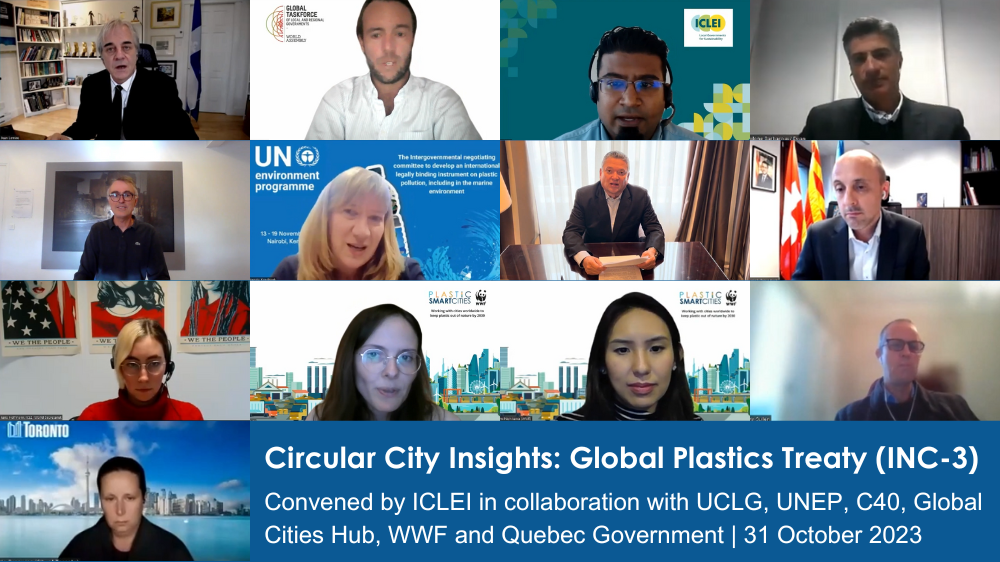A webinar on World Cities Day (31st October 2023) was organised to facilitate discussion and increase awareness and understanding of the role of cities and subnational governments in the lead up to the third round of negotiations of the Global Plastics Treaty (INC-3).
The webinar was organised by ICLEI – Local Governments for Sustainability (ICLEI) and United Cities and Local Governments (UCLG) under auspices of the Local Authorities Major Group of UNEP. Dr. Jean Lemire, Special Envoy, Quebec Government, Canada opens the session by emphasising the importance of having cities and some national governments present to advocate for their role and recognition in the INC process, “We need to unite our voice and come as a coalition of locals and some national governments with clear and joint objectives and priorities.”

Panel Discussion: Cities’ Representatives on Tackling Plastic Pollution
A panel discussion was moderated by Emeline Pluchon, Senior Advisor of WWF-Norway. The panel speakers included: Yumi Nishikawa, Plastic-Smart Cities Lead for Asia, WWF; Rodolphe Barbaroux, Sustainable Development Coordinator in the City of Evian; Gary Cullen, Project Manager in the City of Durban (eThekwini Municipality); Gabriel Boichat, Head of the Delegation of the Government of Catalonia to Switzerland; and Annette Synowiec is the Director of Policy, Planning & Outreach at the City of Toronto.
Yumi Nishikawa, WWF’s Plastic Smart Cities Lead mentioned that the most pressing needs and challenges on plastic pollution in Asian cities are rapid and sprawling urbanisation, cities lacking basic infrastructure, both from a systemic and technological perspective, the ever-decreasing public funds within the city’s budget to maintain or improve infrastructure while at the same time facing a growing waste problem.
“This is compounded by a lack of policy incentives to drive innovation and new markets to replace plastic usage and eliminate plastic waste. And then there’s another big challenge of changing behaviours and habits that is needed to support the transition away from unnecessary plastics,” Nishikawa emphasised.
Gabriel Boichat, Head of Delegation of Government of Catalonia to Switzerland presented a key project the city is leading to address plastic pollution in fast fashion, called Pact for Circular Fashion: “Today it is signed by more than 100 different institutions and actors from different textile value chain in Catalonia to facilitate the incorporation of circularity measures and to avoid the generation of textile waste.”
Annette Synoweic, Director, Policy, Planning & Outreach, City of Toronto, Canada mentioned, “Right now we have been focusing on promoting what we call a reducing single-use programme, championing and highlighting businesses that self-identify as taking measures within their local business or practices.”
From an implementation perspective, the City of Paris approaches the issues of plastics pollution with two guiding principles, as highlighted by Gregoire Merrheim from Paris’ International Relations Department:
- Reduction: The city intends to ban all unnecessary single-use plastics, and promote reuse where possible; and
- Recycled plastics are not considered as the ultimate solution, as we can only recycle plastics a limited number of times and then it is either landfilled or incinerated and doesn’t ultimately sort out the problem.
About the INC Process and The Zero Draft
Brenda Koekkoek, Programme Manager, INC Secretariat explained and provided some insights about the INC timeline and process from 2022 up until the Diplomatic Conference to be expected in 2025.
Pointing to elements that are relevant to local governments, Koekkoek pointed specifically to a section on stakeholder engagement: “You may find interesting how other actors may be included in the future implementation of the instrument. I urge you to have a look at it in terms of its length.”
To continue the discussion, Charis Hoffmann, Consumer Goods Lead, Circular Development, ICLEI WS provided a brief analysis on important points that are relevant for cities on The Zero Draft of the Global Plastic Treaty.
“Local governments are well-positioned to mobilise the engagement of citizens to organise cleanup and remediation efforts. This is really something where we see that they have a fast-moving position where national governments are maybe less fast to act if there is cleanup needed”. Hoffmann also mentioned that this draft’s intention is to support further development of the treaty throughout the next negotiation rounds.
For those who are interested, please see the recording of the full session here:
In the closing remark, John-Baptiste Buffet, Director Policy, United Cities and Local Government (UCLG) highlighted how circularity has been put in the centre of implementation by many cities around the world. With the progression of the plastic treaty negotiations, it is important to continue to strengthen the role and voices of cities.
Note: Parts of this article have been excerpted from ICLEI’s news update here. The recording of the webinar can be viewed in English, Spanish and Portuguese.


